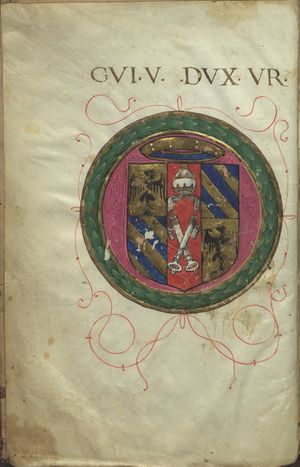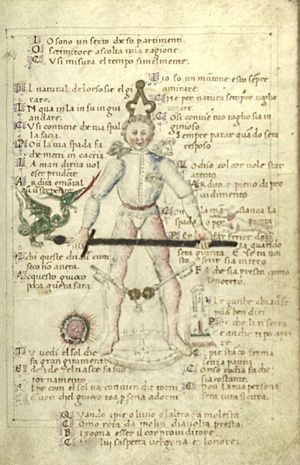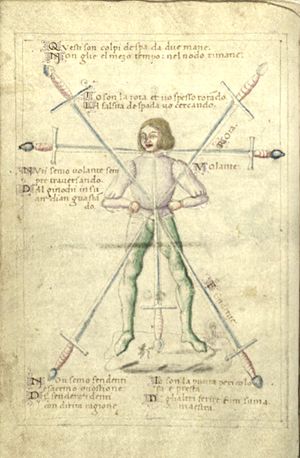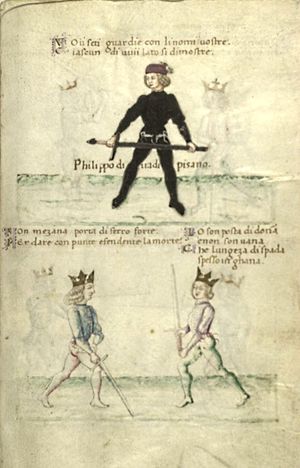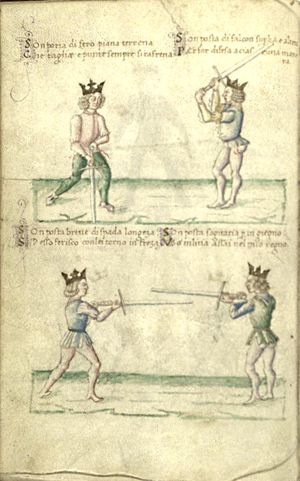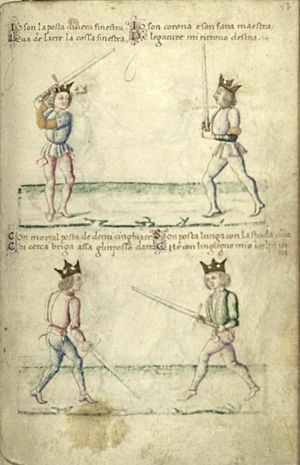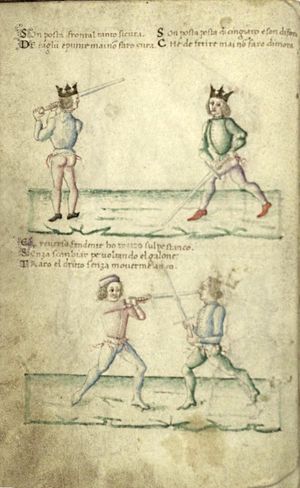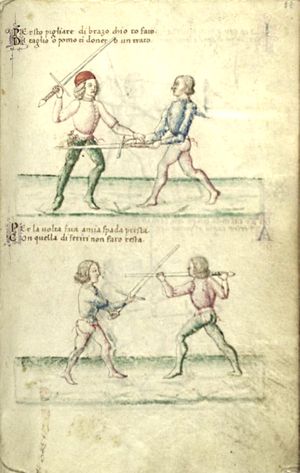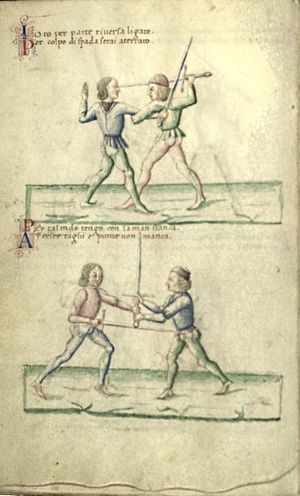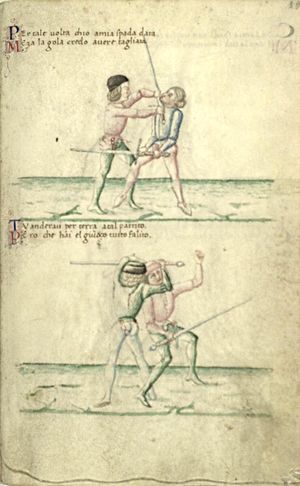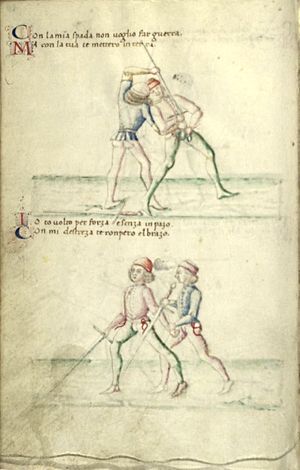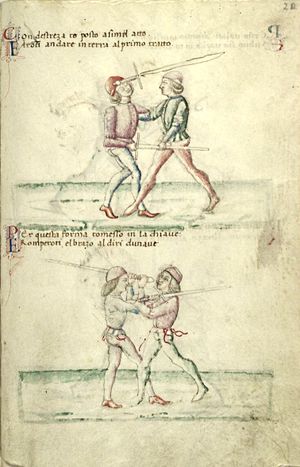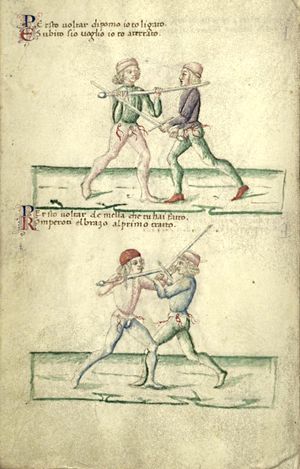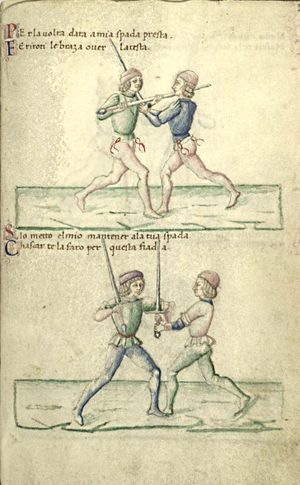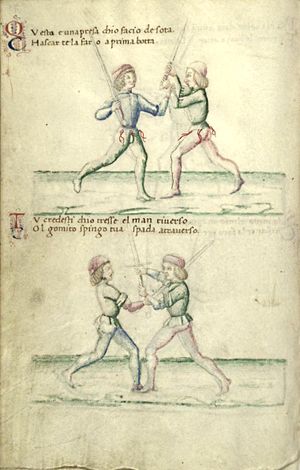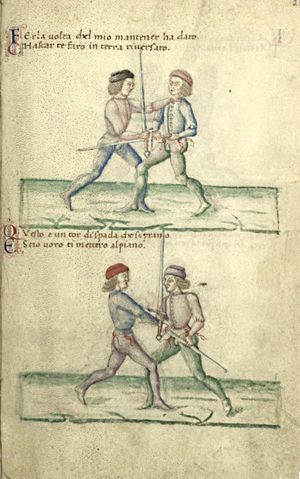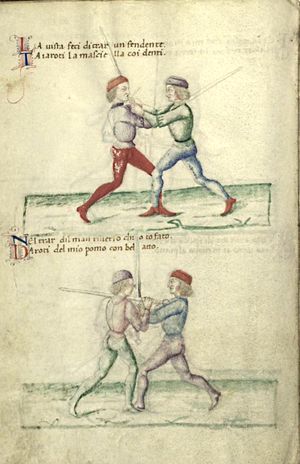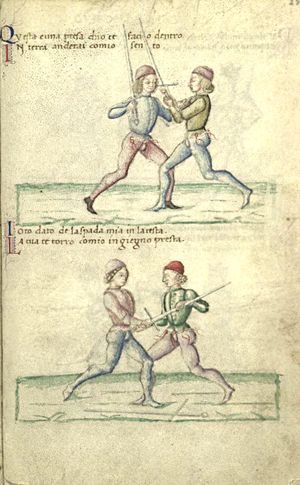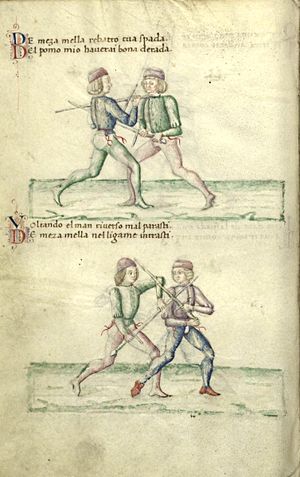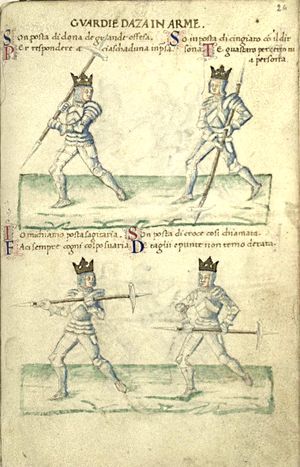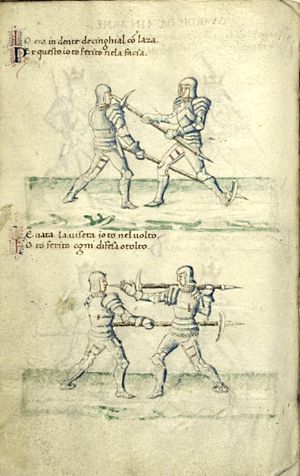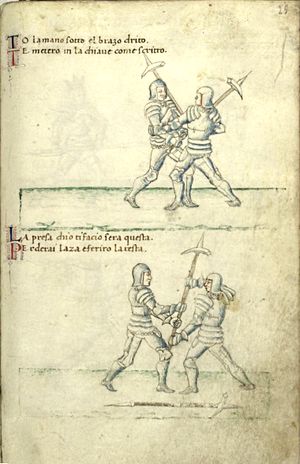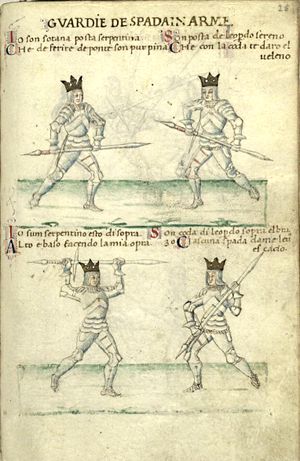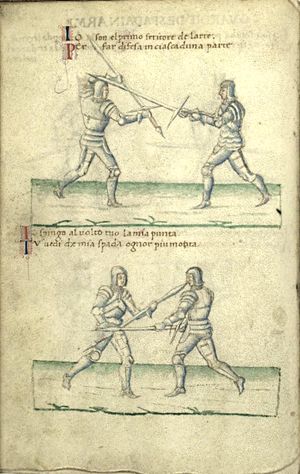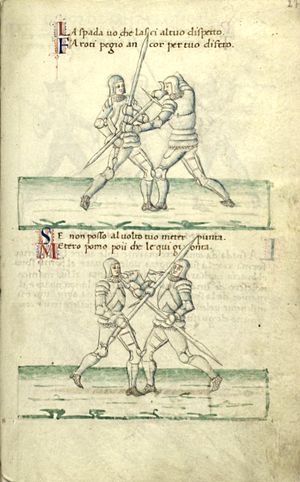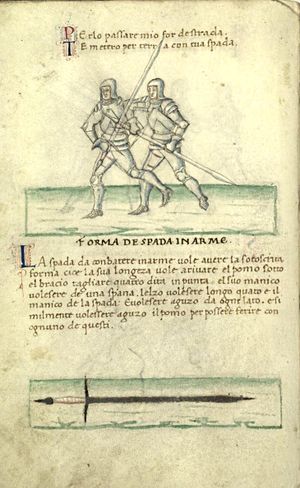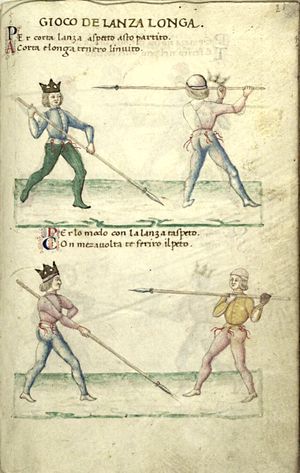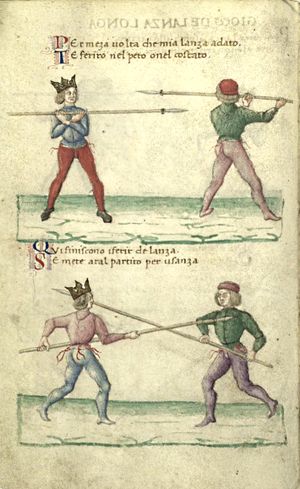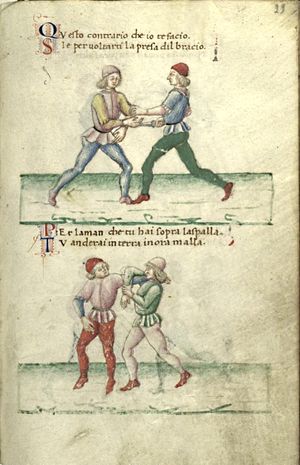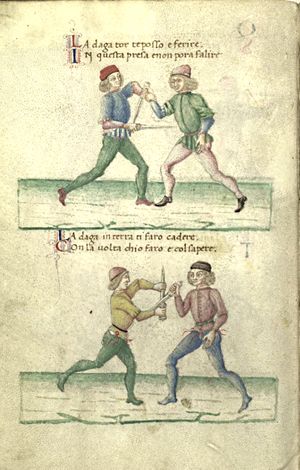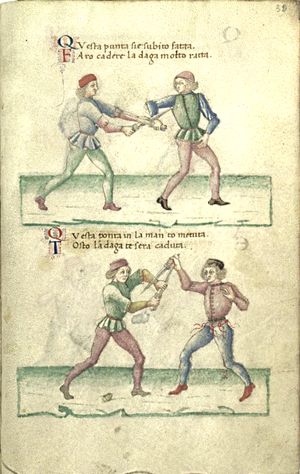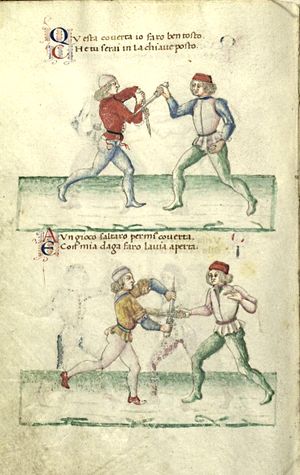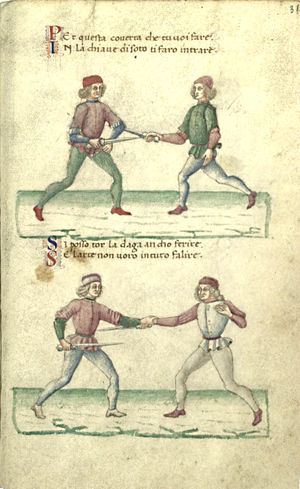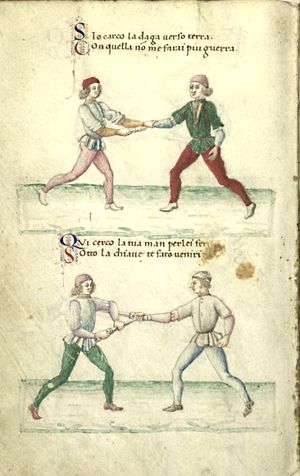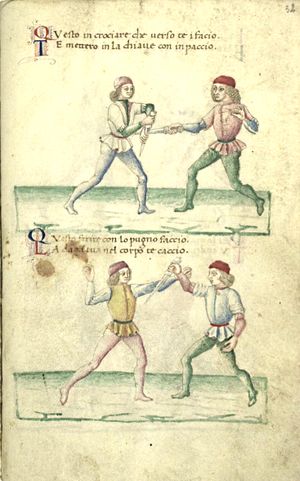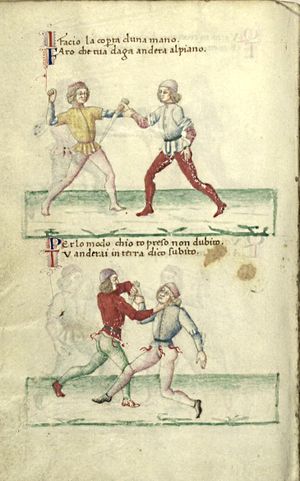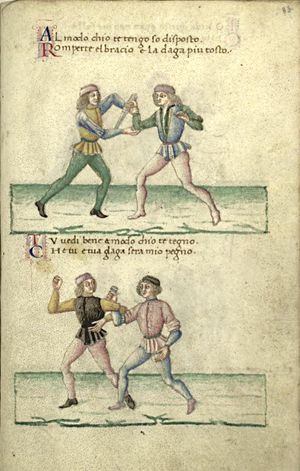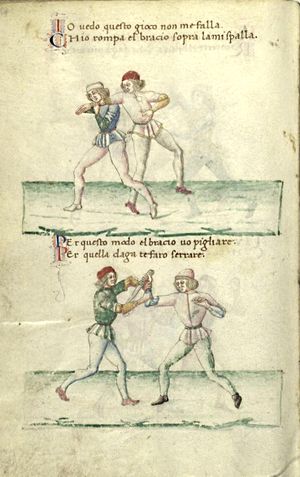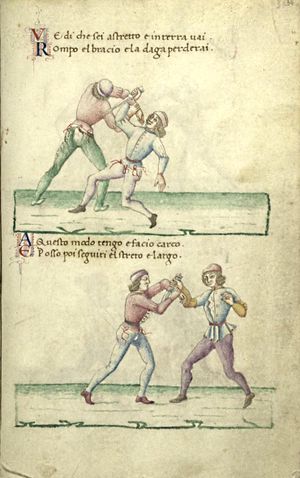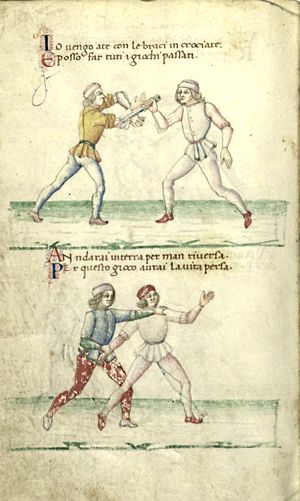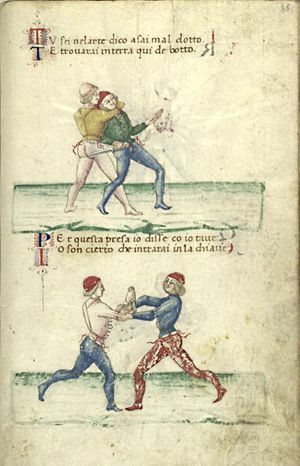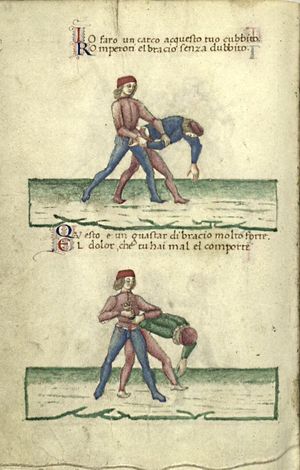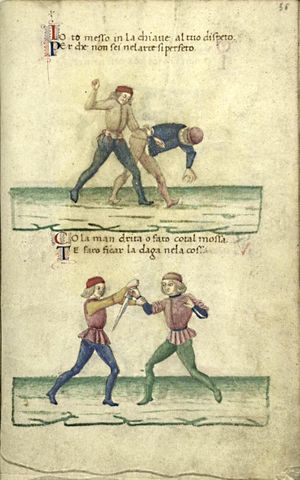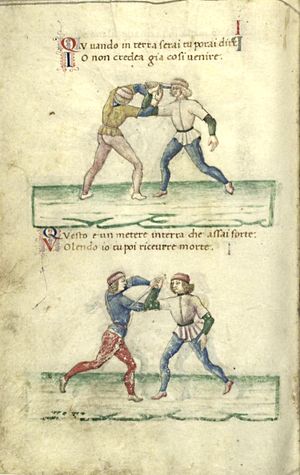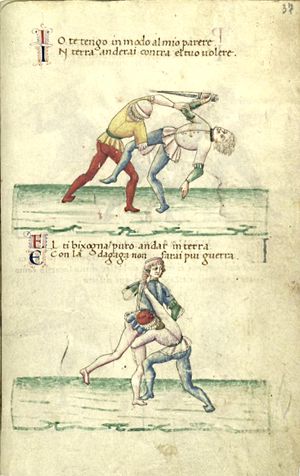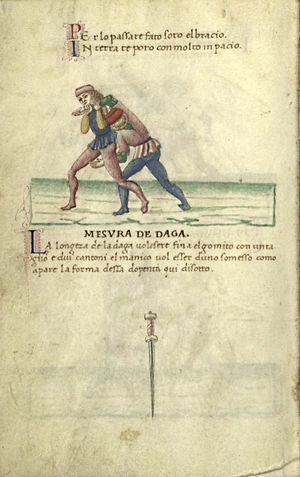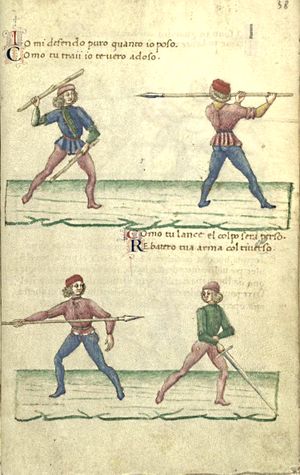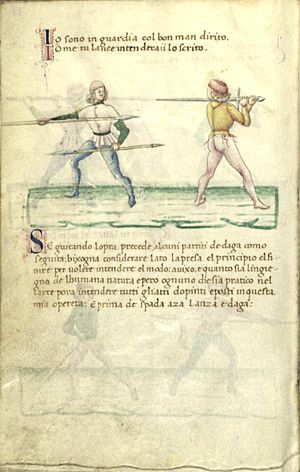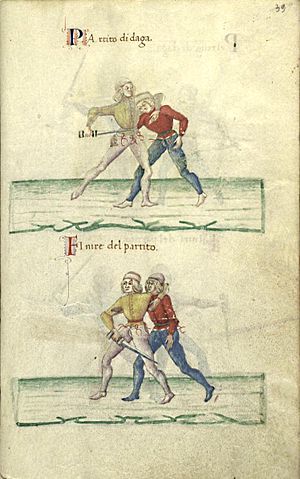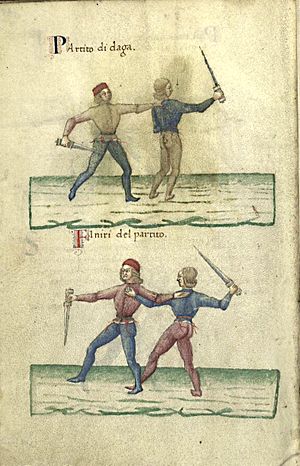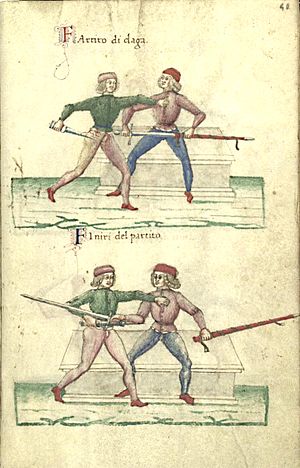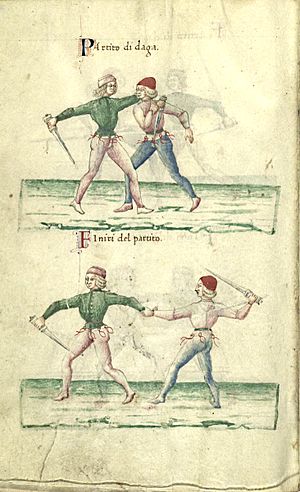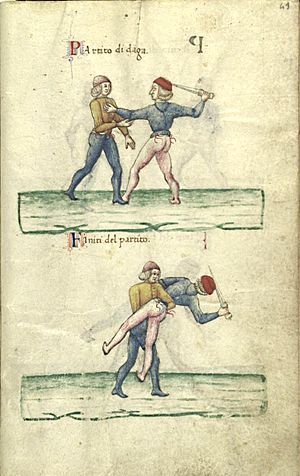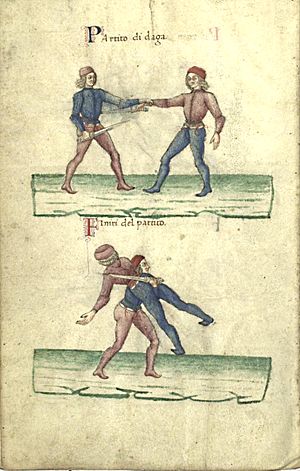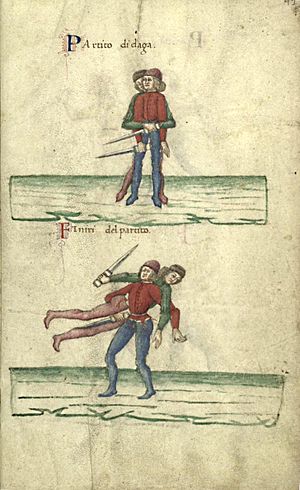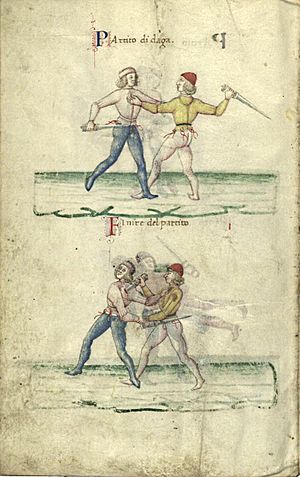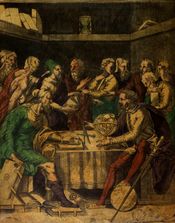|
|
You are not currently logged in. Are you accessing the unsecure (http) portal? Click here to switch to the secure portal. |
Difference between revisions of "Philippo di Vadi"
| Line 68: | Line 68: | ||
|- | |- | ||
| rowspan="4" | [[File:Cod.1324 Iv.jpg|300px|center|link=http://commons.wikimedia.org/wiki/File:Cod.1324_Iv.jpg]] | | rowspan="4" | [[File:Cod.1324 Iv.jpg|300px|center|link=http://commons.wikimedia.org/wiki/File:Cod.1324_Iv.jpg]] | ||
| − | | | + | | <p>'''To my most illustrious Prince Guido di Montefeltro Duke of Urbino'''</p> |
| − | |||
| {{section|Page:Cod.1324 01r.jpg|1r.1}} | | {{section|Page:Cod.1324 01r.jpg|1r.1}} | ||
|- | |- | ||
| − | | | + | | <p>This little book I dedicate to you, most honourable prince Guido,<br/>And to whom I devote in equal measure my intellect,<br/>Since you have paid close attention to the Muses in the sporting jurisdiction of Mars.<br/>The Muses and Mars are wont to show favour to princes.<br/>Phoebus and the Muses especially give honour to you here.<br/>Soon also Mars and Minerva pay you homage.<ref>The translation of these lines was kindly done by Alan Cross, personal correspondence, 28 September 2016.</ref></p> |
| − | < | ||
| − | |||
| − | |||
| − | the | ||
| − | Mars | ||
| − | |||
| {{section|Page:Cod.1324 01r.jpg|1r.2}} | | {{section|Page:Cod.1324 01r.jpg|1r.2}} | ||
|- | |- | ||
| − | | | + | | <p>'''Philippo Vadi offers this book on the Art of fencing in earnest'''<ref>The title that the manuscript is known by comes from this line of the book: ''de arte gladiatoria dimicandi''. ''Dimicare'' means to fight in earnest against your enemies; ''l’arte gladiatoria'' is the art of fencing. Together, the sense is “the art of fencing in earnest against your enemies”, as opposed to fencing for fun, exercise or display.</ref>''' to the illustrious Prince Guido di Montefeltro Duke of Urbino.'''</p> |
| − | |||
| {{section|Page:Cod.1324 01r.jpg|1r.3}} | | {{section|Page:Cod.1324 01r.jpg|1r.3}} | ||
|- | |- | ||
| + | | <p><ref>I am indebted to both Prof Alessandra Petrina and Tom Leoni for their suggestions on improving this section.</ref>Just as my earnest mind, devoid of all cowardice and spurred by an outpouring of natural desire in my earliest thriving years, moved me towards warlike deeds and matters; so did it move me, as time progressed and as I grew in strength and knowledge, to learn more of those warlike deeds, matters, styles and skills through hard work. Such as how to play with the sword, lance, dagger and pollax.</p> | ||
| | | | ||
| − | + | {{section|Page:Cod.1324 01r.jpg|1r.4|p=1}} {{section|Page:Cod.1324 01v.jpg|1v.1|p=1}} | |
| − | |||
|- | |- | ||
| | | | ||
| − | | | + | | <p>Of these things, through the guidance of almighty God, I acquired a good deal of knowledge and this through the practical experience and instruction of many teachers from various different countries, all masters and utterly proficient and knowledgeable in this art.</p> |
| − | Of these things, through the guidance of God I acquired | + | |
| + | And not to diminish but instead to increase this doctrine so that it will not perish from my negligence, because from it comes no small help in battles, wars, riots and other warlike tumults:instead it gives all men trained and instructed in this material immediate and unique help: it has been suggested and required that I compile a booklet concerning these things by people I have surpassed in the art, and am more long winded than: adding to this various figures and placing various examples so that any man versed in this material can use if for assaults at arms, and can defend himself intelligently and be advised of all the types and styles. | ||
| {{section|Page:Cod.1324 01v.jpg|1v.2}} | | {{section|Page:Cod.1324 01v.jpg|1v.2}} | ||
Revision as of 00:55, 1 February 2020
| Philippo di Vadi Pisano | |
|---|---|
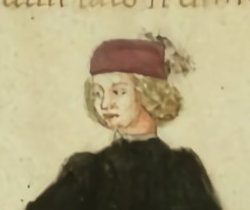 | |
| Born | 1425 Pisa, Italy |
| Died | 1501 Urbino, Italy (?) |
| Occupation | Fencing master |
| Nationality | Pisa, Italy |
| Ethnicity | Ligurian |
| Citizenship | Pisan |
| Patron | Guidobaldo da Montefeltro |
| Influences | Fiore de'i Liberi |
| Genres | Fencing manual |
| Language | |
| Notable work(s) | De Arte Gladiatoria Dimicandi |
| Manuscript(s) |
|
| First printed english edition |
Porzio and Mele, 2002 |
| Concordance by | Michael Chidester |
| Translations | Alternate English translation |
Philippo di Vadi Pisano was a 15th century Italian fencing master. His name signifies that he was born in Pisa, a city in northern Italy, but little else can be said with certainty about the life of this master. It may be that he was the same Philippo Vadi who was governor of Reggio under the marquisette of Leonello d’Este and later, from 1452 to 1470, counselor to Borso d’Este, Duke of Ferrara.[1] Some time after this, Vadi composed a treatise on fencing entitled De Arte Gladiatoria Dimicandi ("On the Art of Swordsmanship"); it was dedicated to Guidobaldo da Montefeltro, Duke of Urbino,[2] and gifted to him between 1482 and 1487,[3] but while this may indicate that he served the duke after leaving Ferrara, there is no record of a Master Vadi being attached to the ducal court.
Vadi was probably an initiate of the tradition of Fiore de’i Liberi, as both his teachings and the format of his treatise closely resemble those of the earlier master. As both Leonello and Borso were sons of Niccolò III d’Este, owner of two copies of Fiore's treatise Fior di Battaglia, Vadi would have had ample opportunity to study his writings.
Contents
Treatise
Images |
||
|---|---|---|
To my most illustrious Prince Guido di Montefeltro Duke of Urbino |
[1r.1] Ad illustrissimus Principem meum Guidum Feretranum Ducem Urbinatem | |
This little book I dedicate to you, most honourable prince Guido, |
[1r.2] Hunc tibi do princeps dignissime guide libellum | |
Philippo Vadi offers this book on the Art of fencing in earnest[5] to the illustrious Prince Guido di Montefeltro Duke of Urbino. |
[1r.3] Philippi Vadi servi Liber de Arte Gladiatoria Dimicandi, ad illustrissimus Principem Guidum Feretranum Ducem Urbini. | |
[6]Just as my earnest mind, devoid of all cowardice and spurred by an outpouring of natural desire in my earliest thriving years, moved me towards warlike deeds and matters; so did it move me, as time progressed and as I grew in strength and knowledge, to learn more of those warlike deeds, matters, styles and skills through hard work. Such as how to play with the sword, lance, dagger and pollax. |
[1r.4] HAvendomi mosso per appetito naturale quale producea fuori el mio franco animo alieno da ogni viltade nelli mei primi e floridi anni ad acti e cose bellicose: cussì per processo di tempo cre- [1v.1] sendo in forze et in sapere mi mosse per industria ad volere inparare più arte e modi de ingiegno de dicti acti et cose bellicose, come è giuchare di spada de lanza di daga e azza. | |
Of these things, through the guidance of almighty God, I acquired a good deal of knowledge and this through the practical experience and instruction of many teachers from various different countries, all masters and utterly proficient and knowledgeable in this art. And not to diminish but instead to increase this doctrine so that it will not perish from my negligence, because from it comes no small help in battles, wars, riots and other warlike tumults:instead it gives all men trained and instructed in this material immediate and unique help: it has been suggested and required that I compile a booklet concerning these things by people I have surpassed in the art, and am more long winded than: adding to this various figures and placing various examples so that any man versed in this material can use if for assaults at arms, and can defend himself intelligently and be advised of all the types and styles. |
[1v.2] De le qual cose medi ante lo aduito de summo idio ne ò acquistato assai bona notitia e questo per pratica experientia e doctrina de molti maestri de varii e diversi paesi amaestrati e docti in perfectione in tale arte. | |
|
So that everyone of a generous spirit will see this, my little work, as a jewel and a treasure, recording it in his inner heart, so in this way this useful art and doctrine will not fall into the hands of uncouth men and those of low-born condition. |
[1v.3] Et per non minuire anzi volendo acrescere tal doctrina acioché per mia negligentia epsa non perisca per che da epsa non procede pocho alturio ne’ bataglie, guerre, rixe e altri tumulti bellicosi: Immo dona agli omini instruti e periti in tale materia uno prestantissimo e singulare sussidio. Ho proposto e statuido nella mente mia de compillare uno libretto concernente cosse le qualle sono più oltra e più prolixe de tale arte: depingendo in quello varie figure e ponendoli exempli diversi, per li quali qualunqua homo instructo in tal materia, possa usare ne l so asaltare e nel so diffendere, astucie, calidità e avisi di più ragione e manere.[2r.1] nga a le mane de homini rusticali e di vile condizione. | |
|
Because heaven has not made these men in earthly flesh and beyond all cleverness and hard work and bereft of bodily agility, but instead they were made without reason,like animals, just to carry heavy loads and do baseand rustic works. |
[2r.2] Perché el cielo non à generato tali homini indocti, rozi et fuori de ogni ingiegno et industria et omnino alieni da la agilità del corpo, ma più tosto sono stati generati a similitudine de animali inragionevoli a portare carichi et fare opere vile e rusticale. E perché debitamente io vi dico loro essere per ogni modo alieni da tal scientia e per l’opposito al mio parere, ciascuno di perspicace ingegno e ligiadro de le membra sue, come sono cortegiani, scolari, baroni, principi, Duchi et Re, debeno essere invitati a questa nobile scientia, secondo el principio de la “Instituta” quale parla e dice così: el non bixogna solo la maestà inperiale essere honorata di arme ma ancora è necesario epsa sia armata de le sacre legge. | |
|
And so for this reason I tell you that they are in every way alien to this science, and it appears to me that the opposite stands for everyone of perspicacious intelligence and lively limbs such as are courtiers, scholars, barons,princes, Dukes and Kings, who should be invited to this noble science according to the principle of the Instituta which states: not only should Imperial Majesty be honoured in Arms, but also armed with sacred laws. |
[2r.3] Né sia alcuno quale creda che in questo mio volume sia posta cosa falsa o invelupata de alcuno errore, perché tollendo e rescecando via le cosse dubiose, solo li metterò cose vedute e provate da me: comenzando ad unque ad exprimere la intentione nostra, con l’adiuto e grazia de lo omnipotente dio del qualle el nome sia benedetto in eterno. | |
|
Nobody should think that there is anything false or any kind of error in my book, because I have left outanything doubtful, and included only things that Ihave seen and tested. Let us begin then to explainour intention, with the aid and grace of theomnipotent God whose name will be blessed forever. |
[2r.4] Et perché alcuni animali inrationabili fano li loro artificii naturalmente, senza alcuna doctrina de l’homo | |
|
And because the various animals, lacking reason,have natural gifts, without any of the knowledge of man (who lacks such natural bodily gifts). So instead of naturally occurring weapons, to make up for the lack of the aforesaid weapons, nature gives man hands. So to those that lack natural weapons she gives the virtue of intelligence and thought. So those that have natural weapons cannot acquire more weapons. So those that lack natural weaponry can better make use of all weapons, natural or otherwise. |
[2r.5] [2v.1] manca de artificio naturalmente sì come il corpo de quello manca de arme debitamente li presta la natura per lo mancamento de dite arme le mane et in loco de quello che ‘l manca de artificij naturali, li presta la virtù de intellecto e cogitatione, e come si lui avesse avuto alcuni artificii naturalmente non poria acquistare artificii per lo resto; e per lo meglio a lui ad usare tutte le arme e tutti li artificii, però non li fo prestato da dita natura né arme né artificio. Have adoncha bixogno tra li altri animali lo intelletto e ragione, ne le qual cosse fiorisce arte et ingiegni, de’ quali due cosse non solo avanza e supera tutti gli animali: ma ciascuno homo docto e adoctato de bono ingiegno avanza a supedita qualunqua sia più robusto di lui e più pieno di forze. | |
|
Having then need above all other animals for intelligence and reason, these things flourish, art and intelligence, and not only these two things raise us above the other animals. But every trained and clever man of good intelligence overtakes and surpasses any other that is tougher than him, and more full of force. |
[2v.2] Iusta illud preclare dictum: ingenium superat vires, et quod maius est et quasi incredibile, sapiens dominabitur astris: nasce da dito ingiegno e da altri e penetrative cogitatione, una arte de vincere superare e debbelare qualunque vol conbatere e contrastare; e non solo adviene che uno homo vinca l’altro, ma ancora nasce modo et posibilità che uno solo superi più persone, e non se mostra solo el modo e documento de assaltare lo adversario e repararsi e deffendersi da lui, ma etiam se insegna advi | |
|
Just to expand on my previous point. Cleverness overcomes strength. And what is greater still and almost incredible: sapiens dominabitur astris. An art that conquers all, and dominates anyone who wouldfight you or stand against you, is born from the afore said cleverness and other piercing thinking. And not just one man against another, but also a method and the possibility is born for one man to overcome many people. And not only is shown the way and theory of combating the adversary, and to defend yourself against him, but also is taught advice on how to take the weapon from his hand. |
||
|
In these texts there will also be a few words on how a small person of little strength can overcome and throw down a big tough and brave man, and so you will see how the humble can overtake the great and the unarmed the armed. And many times it happens that someone on foot defeats and conquers someone on horseback. |
[3r.2] per li quali documenti, spese fiate uno de poche forze e picolo sottomete prosterne et sbate uno grande robusto, e valoroso e cusì adviene che anche uno humile avanza el superbo e uno disarmato lo armato. Et molte volte accade che uno a piedi vinci e sconfigie uno da cavallo. | |
|
But because this is a serious matter it would be very inconvenient if this noble doctrine perished and diminished through negligence, I, Philippo di Vadi from Pisa having studied this art since my first flourishingyears having travelled to and practiced in many different countries, lands, castles and cities to collect the teachings and examples of many perfect masters of the art. By the grace of God having acquired and followed a sufficient quantity of the art I have been free to compose this, my little book, in which I have organised and shown at least the main points of four types of weapon: the lance, sword, dagger and axe. |
[3r.3] Ma perché el seria cossa molto inconveniente che così nobile doctrina per negligentia perise e venise meno, Io philippo di vadi da pisa, havendo ateso a tale arte insino a li mei primi et floridi anni havendo cercato e praticato più et diversi paesi et terre castelle e citade per racogliere amaestramenti et exempli da più maestri perfecti nell’arte, per la dio gratia havendomi acquistato et conseguito una particella assai sufficiente, ho deliberato de conponere questo mio libreto nel qualle ve si ponerà e dimostrarà almeno la noticia di quatro manere d’arme, cioé lanza, spada, daga e aza. | |
|
And in this book written by me I describe a properly organised theory and practice of this art, with examples illustrated with various figures, so anyone new to the art can understand and know how to fight,and by which tricks and vigour he expels, beats aside those of opponents and enemies. I have only included in the aforesaid book the good and true doctrine, which I have received from the most perfect masters, with great pains, and efforts, and vigils. And I have also included things that I have discovered and often tested. |
[3r.4] Et in epso libro per mi si descrivirà regole, modi et atti de talle arte, metendo li exempli con varie figure, aciò che ciascheduno, novo ne l’arte, comprehenda e cognosca li modi de assaltare, e per le qualle astutie e calidità lui expella et rebuti da sé le contrarie e i nimici colpi; ponendo solo nel dicto libro quella doctrina[3v.1] vera e bona la qualle io con grandissimi affanni et fatiche e vigilie ho inparato da più perfectisimi maistri metandoli ancho cosse per mi atrovate e spesso provate. | |
|
Reminding and admonishing all, in plain words, to not dare attempt this art and science unless they are bold,generous and full of courage. Because any coarse, low-born, pusillanimous man must be chased away and blocked from such nobility and refinement. Because to this doctrine should only be invited such men as: men at arms, scholars, barons, lords, dukes, princes and kings of the land and any of those that govern the republic, and to any of these who defend widows and orphans (both of these are pious and divine works). |
[3v.2] Ricordando et amonendo ogniuno non prosumma temerariamente né habia ardire de intermeterse in tale arte e scienzia, se lui non è magnanimo e pien de ardire: perché qualuncha homo grosso d’inzegno, pusilanimo e ville, debbe essere caciato e refudato da tanta nobilità e gientileza: perché solo a questa dottrina se debeno invitare sacomani, homini d’arme, scolari, baroni, Signori, Duchi, Principi e Re di terre de le qualli ad alcuni de loro apertene a governare la repubblica; et ad alcuni de loro apertene deffendere pupili e vedoe: et tute due sono opere divine e pie. | |
|
And if this my little work finds its way into the hands of anyone versed in the art and appears to him to have any superfluous or wrong, please adjust, reduce or add to it as he pleases. Because in the end I place myself under his correction and censure. |
[3v.3] Et se questa mia opereta pervenisse a mane de alcuno docto nella arte e paresseli che in epsa fosse alcuna cossa superflua o manchevole piazali de resecare minuire e acrescere quello li parerà, perché insino da mò io mi sottopono a sua correctione e censura. |
Images |
||
|---|---|---|
|
Chapter I begins. If you wish to truly know Ponder this, my conclusion: Geometry divides and separates The sword is placed in her care, From Geometry fencing is born, And if you heed my doctrines, Music adorns this subject, To make your opinion clearer, So Geometry and Music combine Now if you like what I have said, So answer true as have told you, |
[3v.4] Capitulo primo incipit.
SE alcun volesse intender e sapere Considera bene questa mia sente(n)za [04r] LA geometria che divide e parte LA spada è sottoposta a le sue cure, DA geometria lo scrimir se nasce E Se tu notarai le mie doctrine, PEr farte chiara ancor tua opinione, LA musica l’adorna e fa sugetto LA geometria e musica comparte OR vidi se ‘l mio dir ponto t’agrada Che tu respondi el ver come io t’ho dicto | |
|
Chapter II Measures of the two handed sword. The sword should be of the just measure, As you wish to avoid any trouble, And do this as it is always done: So your mind is not deceived, You want the crossguard strong and square Take note and understand this guide With pointed crossguard, and note well the text. |
[4v.2] Misura de spada da doi mane. Capitolo II. LA spada vole avere iusta misura PEr volere schifare ancora impazio: E Fa che questo te sia ancora in uso A Ciò che la tua mente non s’inganna, VOl l’alzo forte e quadro nel dovere FA’ che tu note e intendi questa giunta: COl pontivo elzo et nota ben lo scripto. | |
|
Chapter III Principles of the sword Grasp the sword manfully, If you have a sharp mind, The art of the sword is just in crossing, On one side you make defence The true edge falls on the forehand side, And follow then as the saying goes, So that you will not play in vain, Letting your sword go hunting You must be very shrewd, Make your heart agree with your defence And note well and understand my text Your guard should not go out of the way, Play of the cross and you will not be conquered, When you are joined with him at the half sword, Also sometimes it is so, Pass out of the way with skill, If you don’t feel your cunning has been lost And take note of and understand this saying, Know that cleverness always overcomes strength, And if you want to make him feel your point, With the point high and the pommel low And the point will find an open way, Control him and grasp the grip of his sword, Always match your passes When you see that the sword moves, Wisdom, strength and boldness act You must have a bold heart, Be as certain as death And note well this text of mine, Make yourself great in trickery Note well and understand this part He loses honour for one single failing Often he makes from this other complaints If the tongue could cut with reasons, And make sure your mind does not fall If you go without reason to offend others, And you must always keep in mind If you would be dextrous, and master the sword, If loyalty for them gives you (their) love, Because they are expected to govern All sorts of good things come from this art, And she maintains in herself such dignity, Acquire both riches and honour If you would have fame in this art, If poverty shows you the cards Sometimes you will find yourself To find this art I have spared no pains, I have kept her firmly imprisoned, |
[4v.3] Ragion de spada. Capitolo III. PIglia la spada in mano virilmente SI tu averai nel cervel tuo sale L’Arte de spada è solo un’incrociare, DA una parte si fano difexa, EL taglio ritto nel suo ritto cada, ET fa’ che segui poii come ‘l dir pone PErché non sia el tuo giucare invano, MEttendo la tua spada alora in caccia ESser ti bixogna acorto molto, FA’ che ‘l cor s’acorde ne defendere, ET nota bene e intende mia scr(i)ptura, GUarda non vadi però for de strada, GIoca de croce e non serai conquixo. QUando la sua a meza spada è gionta ANcora spesse volte achader sole PAssa for de strada con destreza, SI tu non senti aver l’ingiegno perso, ET fa’ che note e intende questo detto: SApii che ingiegno ogni possanza sforza, ET se la punta li voi far sentire, COn la punta alta e col tuo pomo basso ET se la punta trova la via aperta, STregnilo e piglia alor suo mantenere; FA’ che t’acordi sempre nel passare COme tu vedi che la spada el move, SApere, fortezza et ardimento agga EL ti bixogna havere ardito el core, GUarda ben certo como da la morte, ET nota ben questa sentenzia mia: FA’ che tu sie de malizia magno ANcora nota & intende questa parte: CUsì perde l’honor per un sol fallare. SPesso si fa con esso altrui barbotto, SE la lingua tagliasse per ragione, ET fa’ che de la mente tua non cada CHi vol senza ragion altrui offendere EL te bixogna ancora avere a mente CHi vol farsi signor de spada eT destro, SE lialtade serà da te amata PErché s’aspetta a lor de governare QUest’arte in summa & capo d’ogni bene, ANcor mantene in sé tal dignitade, FActe acquistar poi thexoro e honore SI tu averai l’arte sì famoxa SE povertà te mustrarà le carte ALcuna volta tu te trovarai PEr trovar l’arte no m’è parso stento, Commo io la lasso, te giuro in bona fé: Ella me dà denari & se me giova, Cusi intervene a chi in vertù si trova. | |
|
Chapter Four This art is so noble and refined, This art teaches you to turn well, How many are those, the numberless dead There is no greater treasure than life, Abandon material goods, and all valuable things, Oh what a laudable and good thing it is Oh in how many ways it can have a place with you My art is new and made with reason If you do not want your honour to be thrown down, Open your ears to the great text, Make it so the swords are always sisters Do not give advantage of the sword to anyone Good eye, knowledge, speed are needed, Understand my sentence well, A man of great strength can break the guards, Who makes many blows brings venom And if you come to the edge of my line, And note well that of which I speak, Also understand well this other thing, Make sure they are of equal measure, I only esteem the sword of two hands, And so you will not be shamed, If force constrains you to contend Choose a weapon that is light, not heavy, At need you can take another way, As you will hear in my text. |
[7v.2] ¶ Capitolo quarto. QUest’arte è tanto nobile et gintile, QUest’arte t’amaestra a ben voltare QUanti sonno senza numer morte, NOn è magior tesoro che la vita LAssa la robba e ogni cossa degna, O Quanto è coxa laudevole & bona O In quanti modi la ti po' aver loco [08r] L’Arte mia nova et fatta con ragione, SE tu non vorai d’honore esser casso, APre l’orechie al documento magno FA’ che le spade sian sempre sorelle NOn dar vantagio di spada a niuno BOn ochio, saper, prestezza bixogna, INtende ben qui la sente(n)za mia: GRan forza d’homo le guarde si spezza, Chi sa assai colpi si porta el veleno, [08v] ET si tu tene el fil de la mia riga ET nota ben quel che ‘l parlar qui pone: ANcora intende ben quest’altra parte: FA’ che la sia a la mesura eguale, LA spada da doi mane sola stimo ET se tu non vorai aver vergogna, SI forza te stregnesse avere a fare TOrai arma lieve & non pesente ALor bixogna che piglij altra via, | |
|
Chapter V Of Thrusts and Cuts The sword has a point and two edges, One is the false, and the other the true, Forehand and true edge go together, Understand my text well, So that you will find this seam, |
[9r.2] ¶ De punte & tagli capitolo Vº. LA spada sia una ponta con doi taglie, L’Uno sie el falso & l’altro sie el dirito DEritto col deritto inseme tole INtende bene la scriptura mia ACciò che tu ritrovi questa vena | |
|
Chapter VI The seven blows of the sword. We are the fendenti and we make quarrels, And all guards that are made low to the ground, The blows make a bloody mark, Fendente for striking we are well endowed, I am the rota and I have in me such a load, I cannot be courteous or loyal People call me Rota by name, We are volanti, always crossing By crossing us pass without fail, |
[9r.3] Li septi colpi de la spada. Capitolo VI. SEmo fendenti et famo costione ED ogni guardia che se fa terrena COlpi facem de sanguinoso segno FEndente, de ferir noi damo dota, IO sò la rota et tengo i(n) me tal carcho LIeltà et cortesia non posso usare ROta me chiama per nome la giente SEmo volanti sempre atraversando La rota che de sotto in su percote E col fendente ne scalda le gote. | |
|
Chapter 7 Of the thrust. I am he that quarrels with I feel so strong, bold and quick, By my harmful touch, when I join them. |
[9v.2] De la punta.. Capitolo VII. IO son colei che facio custione ET sentomi sì forte, ardita & pronta E Per mal toccho niun quando sum gionta | |
|
Chapter VIII The quarrel of the cuts and thrusts. The rota with the fendente and the volante And when they come to us, The blow of the sword does not lose its turn, If you don’t have a slack memory, Against just one the thrust finds its place, If the thrust throws a rota do not fear Keep in mind here, Your sword is expert at slicing a blow, I make a straight fendente at you with the sword, Do not lose a single hour of learning. Break all low guards Heavy arms do not go quickly to the step, |
[10r] ¶ Costione di tagli & punte. Capitolo VIII. LA rota coi fendente et coi volante E Quando vengon’ a la presentia nostra, NOn perde volta el colpo della spada: SI tu non hai la memoria sciolta, COntra un sol la punta trova patto, SE punta butta rota non temere, CHi fa che ponghe un poco la tua mente, TAgliando un colpo tua spada è perita RIcto fendente farotte de spada NOn perder tempo ad imparare un’ora ROmpe ogni guarda ch’è fatta terena La leve va & ven como frezza in l’archo. | |
|
Chapter IX Of the Cross. I am the Cross with the name of Jesus If I find myself against a different weapon, And when I find a long weapon, |
[10v.2] ¶ De la Croce. Capitolo IX. IO son la croce col nome de iesù SI con altr’arma io me vo scontrando, ET quando un’arma longa sì me trova, | |
|
Chapter X Discussion of the half sword. Wanting to follow in this great work, So that you will understand and use And with arms extended And if you wish to appear great in the art, If you wish to make a stramazone at someone Making the roverso you will be helped, When you wish to enter in to half sword Place yourself in the guard of the boar, And draw a mandritto, and keep this in mind. I don’t want your blows to be solely roverso, Also I advise you when you have entered, And when you strike a roverso fendente, Also, if you see you are going to be attacked, So you will be safe from every side, Clearly the head will also be attacked, It is not necessary that anyone contradict this, |
[10v.3] ¶ Ragione di meza spada. Capitolo X. VOlendo nui seguir questa degna opra, ACciò che ben se intenda & che s’adopra, E’ Con braccia stexe vada ET si tu voi parer nell’arte magno, SI tu facessi stramazzone alcuno, FA che’l reverso te sia poi in aiuto, QUando vorai a mezza spada entrare FA’ che tu sie in guardia de cenghiaro E Tira el dritto e fa’ te sia a mente. NOn vo’ che in tutto sia puro riverso ANcor t’avixo, quando serai intrato ET quando trai el riverso fendente ALora se intende essere attaccato ALor tu sei segur per ogni verso CHiamarasse la testa attaccata ancho Perché tu sei più forte et più siguro A la difesa duro, Et con più breve tempo a far la guerra Né non po' farte ancor chasschare in terra. | |
|
Chapter XI Principles of Swordplay. When you are joined at the half sword, If you are there, keep a sharp eye out, I cannot say in a few words, Brush aside the sword, a little shortened, When you parry the roverso, keep in front, You should also keep in mind, And if the companion strikes and you all of a sudden From below, through his arms, If you strike a mandritto, then beware, And if it comes to you then to want |
[12r] ¶ Ragion de giocho de spada. Capitolo XI. QUando tu sei a mezza spada gionto SE tu vi steggie, tien pur l’ochio pronto NOn posso dire con parole poche, SCosta la spada un poco acortamente QUando pare el riverso porge inanti EL te bixogna aver la mente ancho ET si el compagno tresse, et tu de botto DE sotto in su le braccia sua attraverso, SI tu traesti el deritto alora guarte De intrar sotto & pigliar suo mantenere E farli poi el dovere, Cl pomo martelando al suo mustaccio, Guardando bene che tu non piglii impaccio. | |
|
Chapter XII Discussion regarding the Feints of the Sword. Again I advise you, and note my words well, You then well from every side Feints call out to obfuscate I cannot show you so well, And grasp valour with reason |
[12v.2] ¶ Ragion de viste de spada. Capitolo XII. ANcor t’avixo & notta el mio dir bene, SE chiamano le viste un offuschare IO non te posso cusì bem mostrare [13r.1] ET pigliarai con la ragion l’ardire. | |
|
Chapter XIII Principles of the half-sword. Being then joined at the half sword, And when he loses his way with parrying, And if you want to throw blows, Do not be divided from his point, Following that which I showed you above, Always enter with the point, |
[13r.2] ¶ Ragion de mezza spada.. Capitolo XIII. ESSendo tu pur gionto a meza spada, E Commo perde, col parar, sua strada, E E si pur tu volesti trar ferire, NOn esser già da lui punto devixo, S Secondo che de sopra t’ò mostrato. SEmpre entra con la ponta, | |
|
Chapter XIIII Theory of the half tempo of the sword I cannot show you in writing The half time is just one turn If you note well my writing Of all the art this is the jewel, |
[13v.1] ¶ Ragion di mezzo tempo de spada. Capitolo XIIII. IO non te posso, scrivendo, mustrare EL mezzo tempo & solo uno svoltare E Si tu noterai la mia scriptura, DE tucta l’arte questo si è el giuiello, | |
|
Chapter XV Theory of the sword against the rising blow There are many who make their base And you turn and you will win the test, To clear your mind of illusions, Listen and understand my reasoning, Grasp this, that is a steelyard’s trace, Watch out that your point does not waver, When your sword is joined at the crossing, You can also use in this art |
[13v.2] ¶ Ragion di spada contra la rota. Capitolo XV. MOlti son che fan lor fondamento E Tu roteggia et vincerai le prove. PEr chiarir meglio la fantaxia tua, [14r.1] Ancor poi andare in dente de cenghiare, ODe e comprehende le mie ragione tu PIglia questo, che un tracto di stadera GUarda che la punta tua non svaria, QUando tua spada a la croce sia giunta, TI poi adoprar ancor in questa arte | |
|
Chapter XVI Mastering the sword It is necessary that the sword should be Be sure that your sword does not Your point should watch the face, And you will make your plays always forwards, [END] |
[14r.2] ¶ Amaestramento de spada.. Capitolo XVI. BIxogna che la spada sì te sia GUarda che mai spada tua non stia, FA’ che la punta guardi nella faccia E Farai el giocho tuo sempre davante. | |
I am callipers, that divide into parts, The nature of the bear is to turn, I am a ram, always on the lookout, The right hand should be prudent, The eye with the heart should be alert, With the left hand, the sword is to thrust And he who does not have these keys with him The legs keys it is well said, You see the sun, that makes great turns, The left foot firm without fear, When one or other foot bothers you |
[15r] IO sono un sexto che fo partimenti. Il natural de l’orso si è el girare. Iio son un muntone e sto sempre a mirare. La man dirita vol eser prudente. L’Ochio col cor vole star attento. COn la man stanca la spada ò per punta. E chi queste chiavi cum seco non averà. Le gambe chiave se può ben diri. TU vedi el sol che fa gran giramento. El pié stanco ferma senza paura. QUando i pié o l’uno o l’altro fa molesta. | |
These are the blows of the two-handed sword, I am the rota and I often turn, We are the volante, always crossing, We are the fendenti and we start the fight, I am the thrust, dangerous and quick, |
[15v] QUesti son colpi de spada due mane.
VOlante NUii semo volante sempre traversando. FEndente NOii semo fendenti e facemo quostione.
|
Images |
||
|---|---|---|
Here are the guards with their names, |
[16r-a] Voii seti guardie con li nomi vostre
| |
I am the strong middle iron gate I am the guard of the woman, and I am not vain, |
[16r-c] Son mezana porta di ferro forte [16r-d] Io son posta di donna e non son vana | |
I am the flat ground iron door, I am the guard of the falcon, high up above, |
[16v-a] Son porta di fero piana terrena [16v-b] Son posta di falcon superba e altera | |
I am the short guard of the extended sword, I am the archer’s guard, to deceive |
[16v-c] Son posta breve di spada longeza [16v-d] Son posta sagitaria per ingiegno | |
I am the guard of the true window I am the crown and I am made master |
[17r-a] Io son la posta di vera finestra [17r-b] Io son corona e son fatta maestra | |
With the deadly guard of the boar’s tooth I am the long guard with the short(ened) sword, |
[17r-c] Con mortal posta de denti cinghiare [17r-d] Son posta lunga con la spada curta | |
I am the frontal guard, so secure I am the guard of the boar and I am outside, |
[17v-a] Son posta frontal tanto sicura [17v-b] Son posta posta di cingiaro e son di fora | |
I have made a roverso fendente on the left foot, |
[17v-c] El reverso fendente ho tratto sul pè stanco | |
By this grip of your arm that I have made, |
[18r-a] Per sto pigliare di brazo chio t’ò fato | |
By this turn that I quickly make to my sword |
[18r-c] Per la volta fata a mia spada presta | |
I have bound you from the roverso side, |
[18v-a] Io t’ò per parte riversa ligato | |
In this way I have you with the left hand, |
[18v-c] Per tal modo tengo con la man stanca | |
By this turn that I have given to my sword |
[19r-a] Per tale volta ch’i’ ò a mia spada data | |
You will go to the ground with this technique |
[19r-c] Tu anderaii per terra a tal partito | |
I do not wish to make war with my sword, |
[19v-a] Con la mia spada non voglio far guerra | |
I have turned you with force and without difficulty |
[19v-c] Io t’ò volto per forza e senza inpazo | |
With skill I have placed you in a similar position, |
[20r-a] Con destreza t’ò posto a simil atto | |
In this way I’ll put you in a lock |
[20r-c] Per questa forma t’ò messo in la chiave | |
By this turn of the pommel I have bound you, |
[20v-a] Per sto voltar di pomo io t’ò ligato | |
By this turn of the blade that you have done, |
[20v-c] Per sto voltar de mella che tu hai fatto | |
By the turn quick I have given my sword, |
[21r-a] Per la volta data a mia spada presta | |
If I put my hilt to your sword |
[21r-c] S’io metto el mio mantener a la tua spada | |
This is a grip that I do from below, |
[21v-a] Questo è una presa ch’io facio de fora | |
You believed I would strike with a backhand blow, |
[21v-c] Tu credesti ch’io tresse el man riverso | |
Making the turn that my handle has given, |
[22r-a] Per la volta ch’el mio mantener ha dato | |
This is a disarm that is above, |
[22r-c] Questo è un tor de spada ch’è soprano | |
The feint that I made to strike a fendente, |
[22v-a] La vista feci di trar un fendente | |
From the backhand strike that I have done, |
[22v-c] Nel trar d’il man riverso ch’io t’ò fato | |
This is a grip that I do on the inside, |
[23r-a] Questa è una presa ch’io te facio dentro | |
I have given you my sword in the head, |
[23r-c] Io t’ò dato de la spada mia in la testa | |
I beat your sword aside with the middle of the blade, |
[23v-a] De meza mella rebatto tua spada | |
Turning a roverso you parried badly, |
[23v-c] Voltando el man riverso mal parasti |
Images |
||
|---|---|---|
|
Guards of the Axe in Armour. I am the guard of the woman, of great offence, I am in the guard of the boar, with its saying, |
[24r] GUARDIE D’AZA IN ARME [24r-a] Son posta di dona de grande offesa [24r-b] So in posta di cingiaro con il dir sona | |
I am called the Archer’s guard, I am the guard of the cross, so called, |
[24r-c] Io mi chiamo posta sagitaria [24r-d] Son posta di croce così chiamata | |
I was in boar’s tooth with the axe, |
[24v-a] Io era in dente de cinghial con l’aza | |
Lifting the visor I strike your face, |
[24v-c] Levata la visera io t’ò nel volto | |
I place my hand under the right arm |
[25r-a] T’ò la mano sotto el brazo drito | |
This is the grip that I do to you, |
[25r-c] La presa ch’io ti facio serà questa |
Images |
||
|---|---|---|
|
Guards of the Sword in Armour. I am the lower snake guard, I am the guard of the serene leopard, |
[26r] GUARDIE DI SPADA IN ARME [26r-a] Io son sotana posta serpentina [26r-b] Son posta de leopardo sereno | |
I am the snake, held high, I am the leopard’s tail over the arm, |
[26r-c] Io sum serpentino e sto di sopra [26r-d] Son coda di leopardo sopra el brazo | |
I am the first wounder of the art, |
[26v-a] Io son il primo feritore de l’arte | |
I push my point into your face, |
[26v-c] Io spingo al volto tuo la mia punta | |
You will let go of your sword in spite of your wishes, |
[27r-a] La spada vo’ che lasci al tuo dispetto | |
If I can’t stick a point in your face, |
[27r-c] Se non posso al volto tuo meter punta | |
By the pass I have made out of the way, |
[27v-a] Per lo passare mio for de strada | |
|
FORM OF THE SWORD IN ARMOUR The sword for fighting in armour should have the form as written below, thus: it should be of a length to come with the pommel under the arm, sharpened four fingers from the point. It’s handle should be of a span. The crossguard should be as long as the handle of the sword. And it should be pointed on every side. And similarly, the pommel should be pointed, so that you can strike with any of these parts. |
[27v-c] FORMA DE SPADA IN ARME La spada da conbatere in arme vole avere la sotoscrita forma cioé la sua longeza vole arivare el pomo sotto el bracio, tagliare quatro dita in punta, el suo manico vole eser de una spana. L’elzo vol esere longo qua(n)to è il manico de la spada: e vol esere aguzo da ogni lato, e similmente vol esere aguz o il pomo per possere ferire con ognuno de questi. |
Images |
||
|---|---|---|
|
Play of the Long Lance With a short lance I’ll wait in this way, |
[28r] GIOCO DE LANZA LONGA [28r-a] Per corta lanza aspetto a sto partito | |
From the way I wait for you with a spear |
[28r-c] Per lo modo con la lanza t’aspeto | |
By the half turn that I have made to my spear, |
[28v-a] Per meza volta che mia lanza à dato | |
Here end the blows of the spear, |
[28v-c] Qui finiscono i ferir de lanza |
Images |
||
|---|---|---|
[1] I do this counter to you,Turning you with the grip on your arm. |
[29r-a] Questo contrario che io te facio | |
[2] With the hand that you have on my shoulder,You’ll go to the ground in a bad hour. |
[29r-c] Per la man che tu hai sopra la spalla | |
[3] I can take the dagger and strike youWith this grip, and I cannot fail. |
[29v-a] La daga tor te posso e ferire | |
[4] With the dagger on the ground I’ll make you fallWith the turn that I do, and with my knowledge. |
[29v-c] La daga in terra ti farò cadere | |
[5] This thrust is done immediatelyI make your dagger fall very fast. |
[30r-a] Questa punta sie subito fataa | |
[6] This thrust that I have placed in your hand,Quickly you will drop your dagger. |
[30r-c] Questa ponta in la man t’ò metuta | |
[7] This cover I make very quickly,So you will be placed in the lock. |
[30v-a] Questa coverta io farò ben tosto | |
[8] I will leap to a play using this cover,And with my dagger I’ll open the way. |
[30v-c] A un gioco saltarò per mi coverta | |
[9] With this cover that you want to do,I’ll make you go into the lower lock. |
[31r-a] Per questa coverta che tu voi fare | |
[10] I can take the dagger or strike,If I don’t want to completely fail the art. |
[31r-c] Si posso tor la daga ancho ferire | |
[11] If I push the dagger towards the ground,You will make no more war with it to me. |
[31v-a] S’io carco la daga verso terra | |
[12] Here I look for your hand to strike itI’ll make you come under the lock. |
[31v-c] Qui cerco la tua man per lei feri(ri) | |
[13] This crossing that I make against youI’ll place you in the lock without difficulty. |
[32r-a] Questo incrociare che verso te i’ facio | |
[14] This strike I make with the fist,I’ll stick your dagger into your body. |
[32r-c] Questo ferire con lo pugno faccio | |
[15] I make the cover of one hand,I make your dagger go to the ground. |
[32v-a] I’ facio la coperta d’una mano | |
[16] From the way I have grabbed you I do not doubtThat you’ll go to the ground, I say immediately! |
[32v-c] Per lo modo ch’io t’ò preso non dubito | |
[17] By the way that I have got youI’ll break the arm and the dagger very quickly. |
[33r-a] Al modo ch’io te tengo so’ disposto | |
[18] You see well the way that I have you,So you and your dagger will be my pawn. |
[33r-c] Tu vedi bene a modo ch’io te tegno | |
[19] I see that this play will not fail me.As I break your arm over my shoulder. |
[33v-a] Io vedo questo gioco non me falla | |
[20] Because of this way that the arm is grabbed,I will lock you with this dagger. |
[33v-c] Per questo modo el bracio vo pigliare | |
[21] I saw that you are bound and going to the ground,I break the arm and you’ll lose the dagger. |
[34r-a] Vedi che sei astretto e in terra vai | |
[22] In this way I have you, and I make a burden,And I can then follow the close and wide. |
[34r-c] A questo modo tengo e facio carco | |
[23] I come at you with crossed arms,And I can do all the previous plays. |
[34v-a] Io vengo a te con le braci incrociate | |
[24] You’ll go to the ground by the backhand,By this play your life is lost. |
[34v-c] Andarai in terra per man riversa | |
[25] I say you are badly taught in this art;You will find yourself suddenly on the ground. |
[35r-a] Tu sei ne l’arte dico asai mal dotto | |
[26] By this grip I say I have you,I am certain you will go into the lock. |
[35r-c] Per questa presa io disse co’ io t’ave | |
[27] I make a lock to this, your elbow;I’ll break your arm for you without doubt. |
[35v-a] Io farò un carco a cquesto tuo cubbito | |
[28] This is a very strong destruction of the arm,The pain that you’ll have will ruin your composure. |
[35v-c] Questo è un guastare di bracio molto forte | |
[29] I have put you in the lock, to your despite,Because you are not perfect in the Art. |
[36r-a] Io t’ò messo in la chiave al tuo dispeto | |
[30] With my right hand I have made this move;I will stick the dagger in your thigh. |
[36r-c] Co’ la man drita ò fato cotal mossa | |
[31] When you’re on the ground you’ll say,“I didn’t believe it would come to this”. |
[36v-a] Quando in terra serai ti porai dire | |
[32] This is a strong way to throw someone to the ground;If I wish it, you will die. |
[36v-c] Questo è un metere in terra ch’è assai forte | |
[33] I have you, by the way that I parried;You will go to the ground against your wishes. |
[37r-a] Io te tengo in modo al mio parere | |
[34] You must just go to the ground,And you’ll make no more war with the dagger. |
[37r-c] El ti bixogna puro andar in terra | |
[35] By the pass that I do under the arm,You’ll go to the ground with much trouble. |
[37v-a] Per lo passare fato soto el bracio | |
|
[36] THE MEASURE OF THE DAGGERThe length of the dagger should be just to the elbow, with an edge and two corners. The grip should be the length of the fist, as the shape is shown depicted here below. |
[37v-c] MESURA DE DAGA La longeza de la daga vol esere fin a el gomito con un taglio e dui cantoni, el manico vol esser d’uno somesso como apare la forma d’essa dopent a qui di sotto. |
Images |
||
|---|---|---|
I defend myself just as well as I can, |
[38r-a] Io mi difendo puro quanto poso | |
As you throw, your blow will be lost; |
[38r-c] Como tu lance el colpo serà perso | |
I am in guard with a good forehand blow, |
[38v-a] Io sono in guardia col bon man dirito | |
|
Following the work are some dagger techniques as follows. You must consider the act, the grip, the principle and the finish to understand the way. Knowing how cunning human nature is, and for everyone who is practiced in the art can understand all the actions depicted and shown in this, my little work, mainly of the sword, the axe, the spear and the dagger. |
[38v-c] Seguitando l’opra precede alcuni partiti de daga como seguita: bixogna considerare l’ato la presa el principio el finire, per volere intendere el modo: avixo e quanto sia l’ingiegno de l’humana natura e però ognuno che sia pratico nell’arte porà intendere tutti gli altri dopinti e posti in questa mia opereta e prima de spada, aza, lanza e daga. | |
|
Dagger technique |
[39r-a] Partito de daga | |
|
End of the technique |
[39r-c] Finiri del partito | |
|
Dagger technique |
[39v-a] Partito de daga | |
|
End of the technique |
[39v-c] Finiri del partito | |
|
Dagger technique |
[40r-a] Partito de daga | |
|
End of the technique |
[40r-c] Finiri del partito | |
|
Dagger technique |
[40v-a] Partito de daga | |
|
End of the technique |
[40v-c] Finiri del partito | |
|
Dagger technique |
[41r-a] Partito de daga | |
|
End of the technique |
[41r-c] Finiri del partito | |
|
Dagger technique |
[41v-a] Partito de daga | |
|
End of the technique |
[41v-c] Finiri del partito | |
|
Dagger technique |
[42r-a] Partito de daga | |
|
End of the technique |
[42r-c] Finiri del partito | |
|
Dagger technique |
[42v-a] Partito de daga | |
|
End of the technique |
[42v-c] Finiri del partito |
For further information, including transcription and translation notes, see the discussion page.
| Work | Author(s) | Source | License |
|---|---|---|---|
| Images | Biblioteca Nazionale Centrale di Roma | WikiMedia Commons | |
| Translation | Guy Windsor | The School of European Swordsmanship | |
| Transcription | Marco Rubboli and Luca Cesari | Index:De Arte Gladiatoria Dimicandi (MS Vitt.Em.1324) |
Additional Resources
- Vadi, Filippo. Arte Gladiatoria Dimicandi: 15th Century Swordsmanship of Master Filippo Vadi. Trans. Luca Porzio and Gregory Mele. Union City, CA: Chivalry Bookshelf, 2002. ISBN 978-1891448164
- Vadi, Filippo; Rubboli, Marco; and Cesari, Luca. L'arte Cavalleresca del Combattimento. Rome: Il Cerchio Iniziative Editoriali, 2005. ISBN 88-8474-079-7
- Windsor, Guy. Veni Vadi Vici. A Transcription, Translation and Commentary of Philippo Vadi's De Arte Gladiatoria Dimicandi. The School of European Swordsmanship, 2013. ISBN 978-952-93-1686-1
References
- ↑ For an alternative theory as to the identity of Philippo di Vadi, see Greg Mele. "Interesting information on the Vadi family (Philippo Vadi)". HEMA Alliance Forum. 06 June 2012. Retrieved 09 October 2012.
- ↑ Vadi, Philippo di. De Arte Gladiatoria Dimicandi [manuscript]. MS Vitt. Em. 1324. Rome, Italy: Biblioteca Nazionale Centrale di Roma, 1480s.
- ↑ Rubboli, Marco and Cesari, Luca. The Knightly Art of Combat of Filippo Vadi. Document circulated online.
- ↑ The translation of these lines was kindly done by Alan Cross, personal correspondence, 28 September 2016.
- ↑ The title that the manuscript is known by comes from this line of the book: de arte gladiatoria dimicandi. Dimicare means to fight in earnest against your enemies; l’arte gladiatoria is the art of fencing. Together, the sense is “the art of fencing in earnest against your enemies”, as opposed to fencing for fun, exercise or display.
- ↑ I am indebted to both Prof Alessandra Petrina and Tom Leoni for their suggestions on improving this section.
- ↑ Erased.

